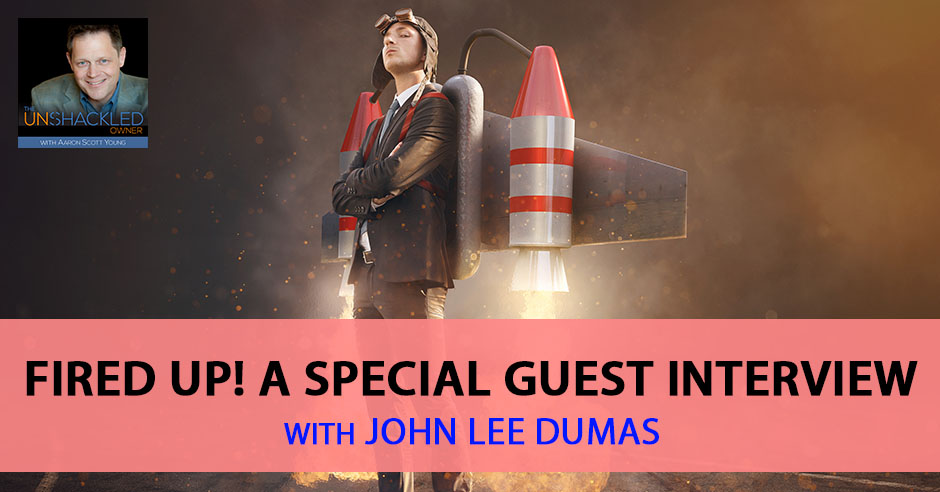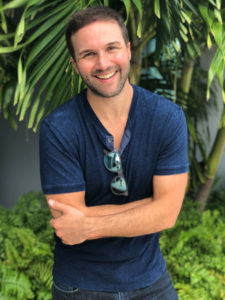
We can only do so much in our business. That is why many successful entrepreneurs know the importance of focusing only on what they are good at and having other people help with the rest. This episode’s guest, John Lee Dumas, the host of Entrepreneurs on Fire Podcast, is a powerful example of building a great business around his genius. Sharing his podcasting journey, he relates how he has been providing solutions to his audience’s pain points. Today, he joins host Aaron Scott Young to discuss his decision to put the financials up on his website and bearing his failures all out for the world to see and learn. He also shares his future plans and imparts some great advice about success.
—
Listen To The Episode Here
Fired Up! A Special Guest Interview With John Lee Dumas
It’s always a great time to be here together and to talk about the skills that it takes and to learn the lessons from those who have already done it to become unshackled. That’s the goal of this program, is to bring you interviews, tips, ideas and shortcuts to becoming more successful. Not just successful, but also getting to a place where you can own your business without the business owning you, where the business can become one of your assets rather than a glorified job. That doesn’t mean you don’t want to work in the business. It doesn’t mean you don’t do the things that you have a genius for. It does mean that as you learn the process of becoming unshackled, you can focus your efforts on those things that matter most for you to do and let others do work that is better for others to do. That way, the business can operate even in your absence. Being unshackled is a powerful concept.
My guest is a powerful example of building a great business around your genius and having a whole bunch of other people to be the glue to take that one thing that you’re doing and go out and present it in a very significant way. My guest is John Lee Dumas, host of Entrepreneur On Fire or EOFire, as they’ve rebranded it. That’s an interesting story for a different story for a different day. Here’s the bottom line, EOFire is a daily program that’s been going on for several years of bringing interviews every single day with different entrepreneurs and asking them and delving into their psyche to pull out the nuggets that are great for you to learn. Part of the thing I love in this interview was John’s ability to get very quickly to the point of what he focused on, what the turnaround moment was for him and how he has filtered everything he’s done from early on. He’ll get to that at the very end of the interview. Without any further ado, here is our interview with John Lee Dumas.
—
John, it is great having you here on the program. Thanks so much for being here to talk about being an Unshackled Owner. You’re such a great example of it, including your move down to Puerto Rico. Let me ask you a few questions. This audience is mostly people who are very successful in business and are trying to figure out how to detach a little bit from the day-today rigors of running the business. The first question I have for you is how would you define which business you’re in? I know you’ve made your money in podcasting, but how would you describe the industry that you’re particularly focused on?
I would define that by saying I’m in the business of providing solutions to the pain points that my audience have. That’s my goal. Every time I wake up and I release an episode for Entrepreneurs On Fire, I’m like, “How is this podcast providing solutions to the pain points of my listeners, a fire nation?” Honestly, that’s the business I’m in, providing free, valuable, consistent solutions to real pain points of my audience and I’m doing it every day.
That’s a super interesting thing. I’ve been your guest twice and I’ve listened to lots of your episodes. At this point, how many interviews have you done?
I’ve done 2,342 episodes.
That’s a lot. I speak to a lot of entrepreneurial events. I know you do too all over the world. How do you feel about this melding of solopreneurs, micropreneurs and personal development? There are a lot of vets that say they’re a business but they’re a personal development or they say they are personal development but they’re trying to sell you, “Be an author, a speaker, a podcaster,” or be whatever. What do you think of how that stuff comes together? Do you think it’s helping or confusing small business owners?
There’s some confusion there. I would say that about 90% to 95% of actual speeches, presentations and talks you’re seeing at business and entrepreneurial conferences are personal developments. They are motivational, inspirational, all of that jazz, which has its place by the way. What I’d like to do, it’s a personal preference of mine of how I like to operate, to teach, to present, is I get on stage and I say, “A lot of you have spent all day getting unbelievable amounts of inspiration, getting great amounts of motivation, hearing amazing stories of person X, Y or Z and their unbelievable life that they’ve led. At the end of the day, you’re going to wake up Monday morning and where’s that inspiration and motivation going to leave you?” It’s important so let’s be very aware of that. What I’m going to spend my 60, 75 or 90 minutes here on stage is to give you 100% practical step-by-step presentation that you’re going to be able to take back to your business and hopefully apply it on Monday, Tuesday, Wednesday. It’s going to start making you money going forward.
This is a concrete example. One of my favorite presentations that I’ve been giving is called the Million Dollar Podcasting Funnel where I literally, step-by-step during this presentation, teach people how I created four multimillion-dollar funnels with my podcast being at the top. I’m very clear to say that this podcast can be interchanged with a blog, YouTube channel, social media handle or whatever your Main Traffic Generator or MTG at the top is. It can be replaced there and everything else works all the way down to the bottom. People come up to me afterward like, “John, I’ve been inspired by a lot of people. I love that because I needed that. I needed to be inspired. I needed motivation. I needed to have some walls broken down. I needed some personal development. I did need some practical advice on how to build a business, on how to create a funnel that converts into dollars.” Motivation is not going to put food on the table. It’s not going to put a Caribbean beachfront mansion roof over your head, but Million Dollar Funnel will. That’s what I’m bringing to the table.
John, you came out of the military and it wasn’t very long before you started the podcast. Is that accurate or inaccurate?
That’s inaccurate. I got out of the Army in 2006 and I tried a lot of things. I went into law school. I didn’t like it so I dropped out. I tried corporate finance, but I didn’t like it so I left. I went to commercial real estate, residential real estate. I went through six years of struggle. Struggles are also great learnings and great understandings of who I was and what I wanted in this world. Six years after I got out of the military, I came up with the a-ha moment of launching Entrepreneurs On Fire. It was definitely the furthest thing away from an overnight success. I call it my decade of searching because from 22 when I graduated from college until 32, I was searching.

Entrepreneurs On Fire Podcast: Struggles are also great learnings and great understandings of who you were and what you wanted in this world.
When you decided to put financial up on your website to describe where the money was coming from, what was the motivation behind that? Most small business owners are terrified to tell the truth about how much or how little money they making.
The truth hurts for most people. You can buy gross revenues. You can spend more money on ads. You can bring on more affiliates. You can buy a Super Bowl commercial. You can do a lot of things to have this unbelievably beautiful top-line gross profits, but what’s your net profit margin like? What’s the actual percentage you’re keeping of that top-line gross profit? I’m absolutely obsessed with that number because that’s what I care about. That’s what gives me the lifestyle, location and financial freedom to move down to Puerto Rico and to buy my dream home. I got back from a 90-day trip around the world, where we were working less than an hour a day because we built a business in the financial war chest to be able to do things like that.
I’m absolutely passionate about that. To answer your initial question directly, it was back in 2012, early January when I was like, “I want to do this online marketing, online entrepreneurship, online business thing.” I was looking around for people who are doing it. I stumbled across a guy, Pat Flynn of Smart Passive Income, who have been doing this since 2008. He had been publishing income reports for multiple years at that point. Coming from the military where everything’s traditional and we have a chain of command, I had some reservations about the online world. I didn’t know if you could be a good guy or a good girl. I didn’t know if you could not be slimy and make money. I was not willing to go down that slimeball route. Luckily, I found Pat, who was as great standup individual family man. He’s doing great things. He was providing consistent value on a daily basis to a real pain point that his audience had. He was making significant money and showing exactly how we made it.
I said, “If I ever get to the point where I’m generating real revenue, actual money in my business, I’m going to do the exact same thing for podcasters with what Pat did for bloggers.” Sure enough, I launched my podcast later that year. It took about a year. Two years after discovering Pat Flynn’s income reports, I said, “Kate, we’re not just making but we’re netting six figures a month at this stage. This is real money. Let’s start showing the world what we’re making, how we’re making it, the wins that we’re having to be emulated, but also let’s show our failures of mistakes and the money that we’re losing because of bad decisions as well. It’s going to be an open book. Let’s bring my CPA, my accountant, to verify everything and to show people that everything that we’re doing is completely by the books and transparent. Plus, he can give a tax tip as well while he’s at it.” We’d bring my lawyer on every other episode and every other income report to give a legal tip for entrepreneurs as well. We make it this full encompassing, very viable report that we do.
We launched our 74th consecutive monthly income reports. We’ve never been below six figures in net revenue. We live in this sweet spot for us of between $100,000 to $200,000 a month in net profits. We’ve had a few great months, like $500,000, $400,000 or $600,000. Those are rare. Those are the big months, but it’s a very steady, small and lean business. One thing that we’ve added, the past ten income reports that I love getting back to something that you had mentioned is we have a percentage of net revenue. We have a number every month that shows, “We might have made $150,000. We kept $130,000 or $128,000. What’s that percentage?” We are literally in the 80% every single month. That’s a number that I am obsessed over because to me, it’s like, “How can we keep that number there or higher?”
One of the things I love about it was when I first saw you do it, I thought this is a great marketing thing because you’re throwing off big numbers. If somebody is searching and they say, “If I follow the guidance of this mentorship through your podcast training, I’ll jump in.” There’s also a side of it that forces accountability. If you’re putting it out there, you can’t rest on your laurels. You’ve got to keep pushing. It’s something a lot of business owners who hide the truth about their business through a lot of rhetoric, a lot of buzzy words, a lot of big talk at Meetup. They’re doing themselves a disservice because they’re not dealing with real growth. They’re just trying to impress somebody.
Let me add another angle on that as well. I get why some other businesses and some people in general, may not want to be public about their income. There are a lot of reasons that might make sense or you may not be comfortable with it. To your point, at least having an internal income report where your actual fingers and your team’s fingers are on the pulse of how your business is operating on a month over month basis. Three words, “Know your numbers.” People that win know their numbers. People that lose don’t know their numbers.
You’ve done some great things. You’ve been incredibly disruptive in the entrepreneurial small business space, especially with podcasting. You’ve been a leader in developing your online courses. You’re speaking all over the place. You’re living in Puerto Rico and you’re going around the world and all these wonderful things. What’s coming up for JLD that is maybe both exciting and a little scary? What’s your next stretch goal?
My next stretch goal is pretty clear at this moment. Since 2016, I’ve been self-publishing a journal a year. I published The Freedom Journal in 2016, The Mastery Journal in 2017, The Podcast Journal in 2018 and then The 100-Day Gold Journal in 2019. All had been massive successes and all have done well because my audience has supported them and had a need for what they deliver. I’ve never gone with a traditionally published book route. I signed a deal with HarperCollins Leadership. On April 30th, my manuscript is due to 2020. The book will be coming out in March of 2021. It’s still a ways out, but that’s a huge stretch goal or something that’s coming up in my world.

Entrepreneurs On Fire Podcast: People that win know their numbers. People that lose don’t.
I look in the background where you’re at right now and I see The Science Of Getting Rich by Wallace D Wattles. It is an amazing book. I feel like that’s one thing that I’m missing right now. I didn’t want to write a book until I was ready. I’ve been rocking this for many years, having a seven-figure business for six of those years. I’ve already proven both my success and my staying power in this industry over that time. A twenty-year experience would even be better, but I figured out there’s no time like the present. Let’s go for it now. I have the concept, the book and I’m excited about going forward with it. That’s my next big stretched goal.
Do you have any final advice, counsel or words to these people? Remember, primarily this audience, they’re doing well but they feel chained to the company. They’re trying to look for ways to begin to unshackle themselves from being the most critical employee in their business. You’ve obviously built something around your competency, but you can’t do it alone. I love to know your numbers but what else could you give these guys?
I’ll give them an Albert Einstein quote and I’ll narrow it down a little bit. That quote that I love that was a game-changer for me when I was trying to figure out what my thing was that was going to unshackle me is, “Try not to become a person of success, rather become a person of value.” For those ten years, when I was 22 to 32, I was chasing success and I wasn’t finding it. I was struggling because of that. When I flipped that around and said, “How can I provide value?” To me, the shining a-ha moment was a daily podcast interviewing entrepreneurs and sharing those messages, those lessons learned with the world. That built into a seven-figure business. All of my chasing success didn’t build anything. My delivering value on a daily consistent basis delivered a seven-figure a year business. What is it that you love doing, that you’re passionate about? That you’re excited about? Also very critically, you’re providing value to the world and you’re providing a real solution to actual pain points. Start producing content there. Start doing daily content that can be short and sweet. It can be 30 seconds. It can be 2, 5 minutes or whatever it might be. Start producing solutions to the biggest problems that your ideal customer has. That micro-niche that you love, you can rise to the top and the world is your oyster.
John, thanks so much for being here. I’ve enjoyed it. Take care, bye.
—
There’s so much meat in that short interview with JLD. I hope you were taking good notes. One of the things that stood out for me was when he talked about looking for mentorship. He looked for somebody else who’s doing something like he wanted to do and he found Pat Flynn. He started to emulate his mentor. Another thing was that he decided that it would be good, as part of that emulation, to be vulnerable and to put his data out in front. He acknowledged that maybe that’s not for everybody. I agree with it but it’s an interesting idea about vulnerability, accountability, walking your talk and having to show what’s working and what’s not working. If you want to be a thought leader as he’s become, then part of what you have to do is show the positive and negative results of your efforts.
Scientists have been doing it forever. He was doing it in a very transparent way with an online business. I love the Einstein quote. It was great that he ended with that. It’s something valuable for us to take away, which is the difference between trying to seek our own self-gratification, our own wealth, our own riches versus delivering something to the world that they want to buy. He’s trying to address his audience’s pain points. I don’t know how many times I’ve said, “I know you’re passionate about that thing, but nobody wants it. How about getting passionate about doing something that people want?”
If we think about that and listened to Edison and JLD, maybe even listen to Aaron Young and focus on figuring out how to deliver value to the world, value to your customers, greater value to those people that you’ve engaged with so that they stay a customer and you can continue to sell to them. You become the go-to person they seek out first for answers. That’s why we have this show. That’s why I bring you these interviews to get you those little gold nuggets that you can take and maybe put some yellow sticky tabs up in your office, maybe make some notes, maybe review them before you go to bed. These are the things that will help you be more successful. As JLD talked about, he created funnels. He started saying, “The show leads to this training, that training, this book launch.” I want to remind you that this show is to bring you this great information.
If you want to get your advanced degree in becoming unshackled, I invite you to reach out to me to Support@AaronScottYoung.com. Let’s talk about the Unshackled Owner Class. We’re going to be starting another one in the beginning of January 2020. It’s time to get your business organized in a way that can move you much more rapidly forward towards your goals where you can have greater wealth, less time in front of your screen, more time with other things that are also important, your family, friends, hobbies, religion, charitable work. Let’s make sure you’re organized so that these nuggets not only inform your choices, but you have a recipe to follow to become more successful every year so you own your business, your business does not own you. That’s what it means to be an Unshackled Owner. Shoot me an email. Let’s get on the phone. Let’s talk about it. Let’s make 2020 the very best year you’ve ever had. We’ll see you again on the next episode.
Important Links:
- EOFire
- Smart Passive Income
- The Freedom Journal
- The Mastery Journal
- The Podcast Journal
- The 100-Day Gold Journal
- The Science Of Getting Rich
- Support@AaronScottYoung.com
About John Lee Dumas
 John Lee Dumas is the host of Entrepreneurs on Fire, an award winning podcast where he interviews inspiring Entrepreneurs who are truly ON FIRE. With over 2000 episodes, 1 million + listens a month, and seven-figures of annual revenue, JLD is just getting started. Visit EOFire.com to set YOUR Entrepreneurial journey ON FIRE!
John Lee Dumas is the host of Entrepreneurs on Fire, an award winning podcast where he interviews inspiring Entrepreneurs who are truly ON FIRE. With over 2000 episodes, 1 million + listens a month, and seven-figures of annual revenue, JLD is just getting started. Visit EOFire.com to set YOUR Entrepreneurial journey ON FIRE!
Thank you so much for having me on the show!
JLD